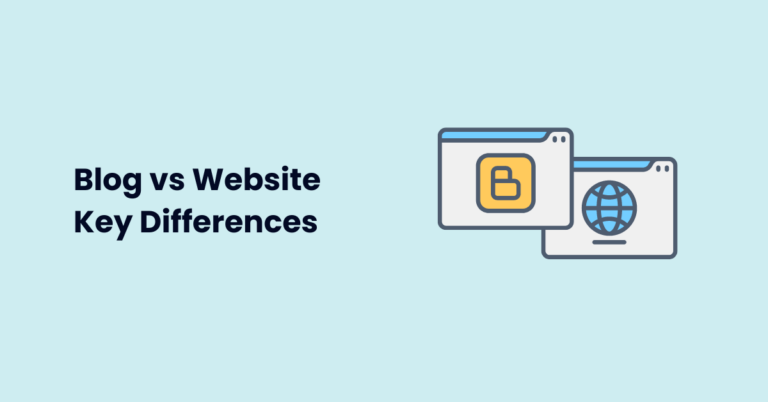Are you confused about blog vs website and wants to know the main difference between both of them ?
So, Let me explain.
The easiest way to understand the difference between them is that a blog and a website are similar because a blog is a type of website.
Still Confused ?
Let me breakdown clearly with definition, examples, and key differences to give you more clarity to choose and create one of them as per your needs,
What is Blog ?
A blog is like an online journal or a website with informative posts in text, that allow the authors to share their knowledge, experience, and opinions on any interesting topic.
Blogs are usually text-heavy in the form of posts, shown in reverse chronological order, where the latest posts appear first and then the older posts.
You must have seen these travel bloggers and food bloggers on Instagram. They use short-form content, such as pictures and videos, to share information on social media.
In a blog website, they use textual content with visuals to express themselves by sharing the information with the target people using blogging platforms like WordPress, medium, etc.
Let’s look at a few examples of popular blogging sites.
Examples of Popular Blogs
1. Nomadic Matt – Travel blog

This blog is owned by Mathew Kepnes, a traveler who has been traveling since 2006 and shares his knowledge on traveling on a budget and starting a travel blog.
The purpose of this blog is to generate more traffic through his informative posts to help other travelers book their tickets and rooms.
He also guide them with the necessary knowledge about each country they wish to travel and upsell his services and books.
Some of the other travel blogs are
2. Forbes India – Business Blog

You must have heard about Forbes. This is one of the popular business blog that talks about across different domains and market.
They talk about different topics like Leadership, innovation, business, stock market, startup and technology news, etc.
The purpose of this blog is to provide information about the business environment, get more traffic, and build thought leadership in the industry and make the revenue with digital products and subscriptions.
Some of the other business blog are
- Tech crunch
- Copyblogger – Niche business blog (content creation)
- Buffer – Service based business blog
3. James Clear – Personal Blog
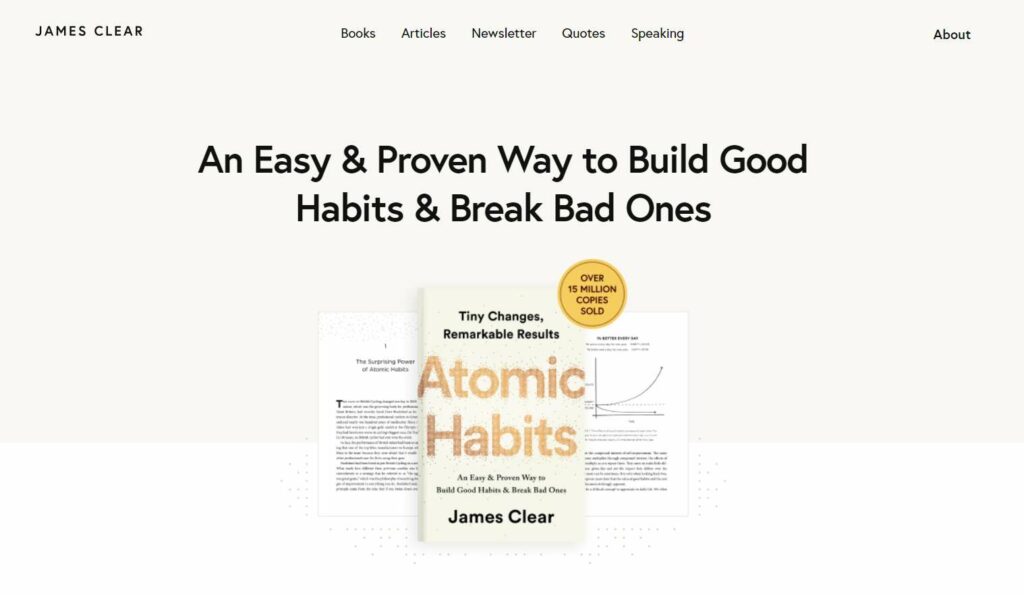
James clear(.)com is the personal blog that run by James clear.
He is the author of the popular book #1 New York times bestseller “atomic habits”. I hope you must heard about this book.
Before publishing the atomic habits, James clear started with writing the articles on his own blog sharing information on topics about health, happiness, productivity and more.
He gained the authority by attracting the target audience to his blog. Now, apart from his blog and published books, he also speaks at the events and runs the newsletters.
Some of the other personal blogs are
What is a Website ?
A website is a single webpage or a group of web pages linked to one another under one specific domain name that shares a common interface and design.
The website usually states information about a particular person or the company that owns the website. Unlike a blog, a usual website is not very text heavy.
A website is static or dynamic and often has a blog section that may or may not be actively used or updated.
However, many companies use this blog section to publish posts that will bring traffic to their website and convert them to clients.
Let’s look few examples of popular websites.
Example of Popular Websites
1. Samsung – Business Website
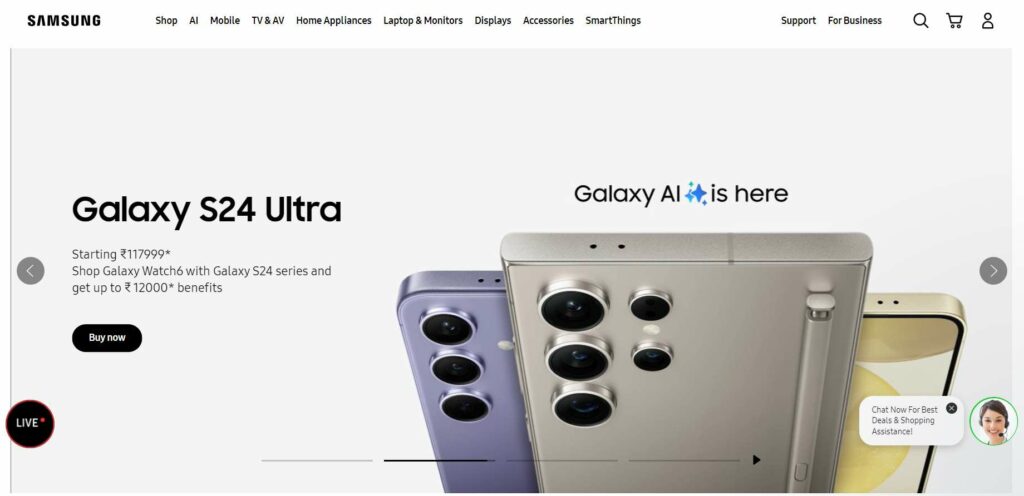
This is the official website of Samsung. There website has all the details about their products like home appliances, mobile phones, laptops etc.
Anyone can visit the Samsung website and purchase the products. There will be not much informational content on the website.
Some of the other Business websites are
2. Amazon – Ecommerce Website
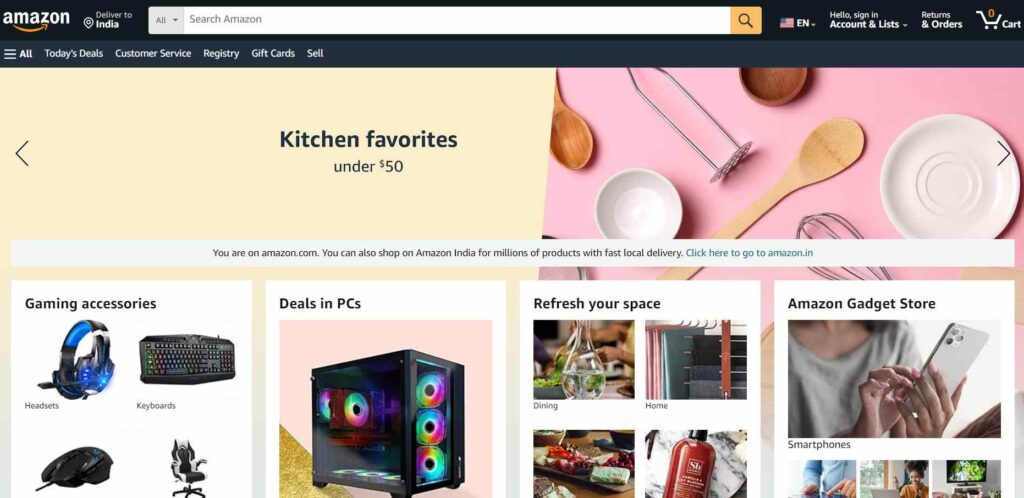
Amazon doesn’t need an introduction. This is an E-commerce website, where the sellers post their products, and the users who intend to buy, come online to shop from the website.
If you want to sell physical products, you can build a website and run business by selling your physical products on your eCommerce site.
Some of the other ecommerce websites are
3. Udemy – Online Course Website
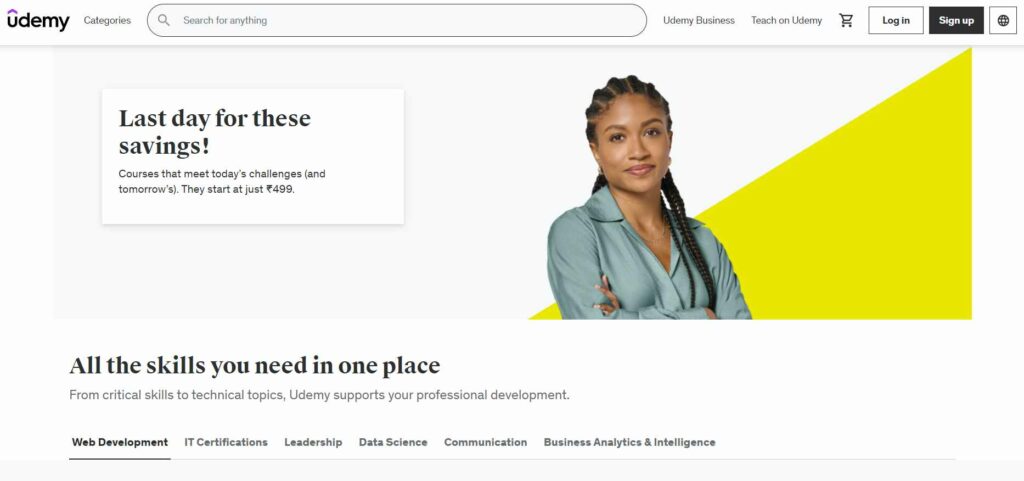
This is one of the most popular websites for people who are looking to learn new skills online out of their own interest.
If you want to teach people and sell your courses online, with your expertise, you can build the online course site using LMS or WordPress platform.
Some of the other Online course websites are
Blog vs Website: Purpose
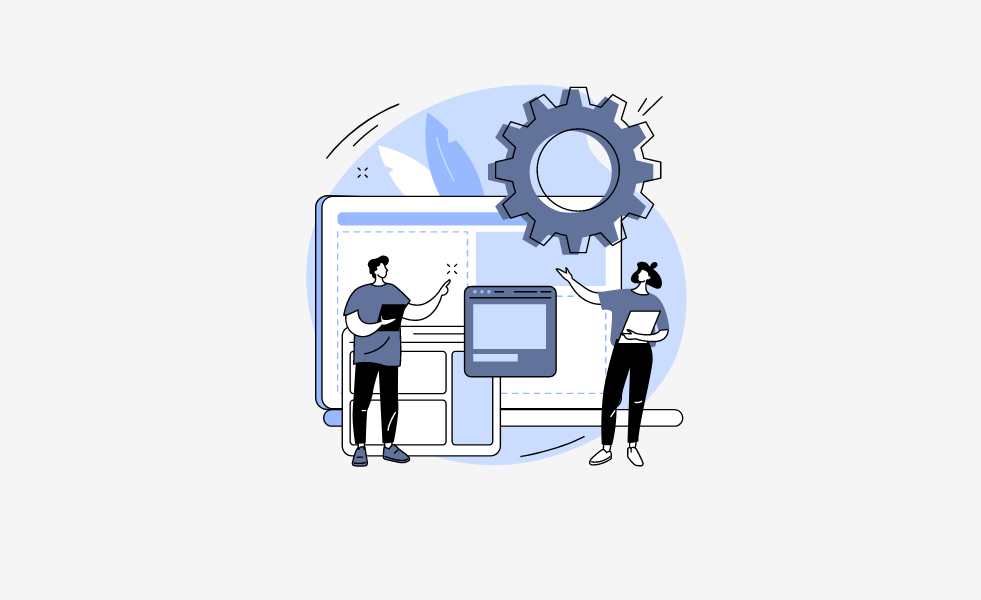
Purpose of a Blog
There are many reasons for starting a blog, below are 3 key reasons for you to start a blog
1. Personal Expression
Many people use blogging to share their thoughts and opinions with the world.
You can share your opinions and voice that resonates with many people worldwide using your blog, which hosts on any blogging platform.
You can build a community of people similar to and interested in your niche using your ideas and experiences.
For example, travel bloggers share their travelling experiences, learnings, and guidance with those who travel.
By doing so, they are attracting more people with similar interests to their blog, eventually building a community of travellers.
2. Traffic generation
Many companies and business owners have blogs to share their expertise on a particular niche by addressing their target audience’s doubts and problems.
By doing so, the right audience will start visiting the blog, and the traffic of the website will increase through the blog, which is a part of the website.
The increasing traffic to the website through blogs has many positive advantages, such as increased visibility, online presence, authority in the industry, etc.
3. Monetization
A Blog is monetized in many ways and will be profitable in the long run.
Below are a few of the ways you can earn money through blogging.
- Placing the contextual ads on the blog (Google Adsense)
- Selling the other products through affiliate links
- Selling digital products or physical products
- Providing the services or online consultation
Everybody who started a blog to share personal stories continues to monetize the blogs.
For example, take the Nomadic Mat blog that we discussed earlier.
He started blogging in 2008 to share his travel experiences; he now has a few affiliate links and landing pages for the books and courses he offers.
Purpose of a Website
1. Business Branding
After the global pandemic, everything has is digitized- education, payment, working, meetings, shopping, and almost everything is online.
In this world of digitalization, if your business does not have an online presence, then it is hard to reach beyond a particular territory.
Businesses should create and own a website online to get visibility and brand awareness and take advantage of being globally visible.
2. Professional Networking
Similar to how people moved from getting autographs from celebrities to clicking selfies with them, businesses are moving from exchanging business cards to exchanging website links and social media handles.
So, having a website makes it easier for interested people to learn more about your business and your services with just one click.
3. Announcements
A website is a place where your online presence and information are all static, unlike a blog, where blog posts are regularly updated for users to consume.
However, your website is a go-to place for the audience to get the latest updates about your company, product launches, services, hiring alerts, etc.
Blog vs Website: Content and Structure
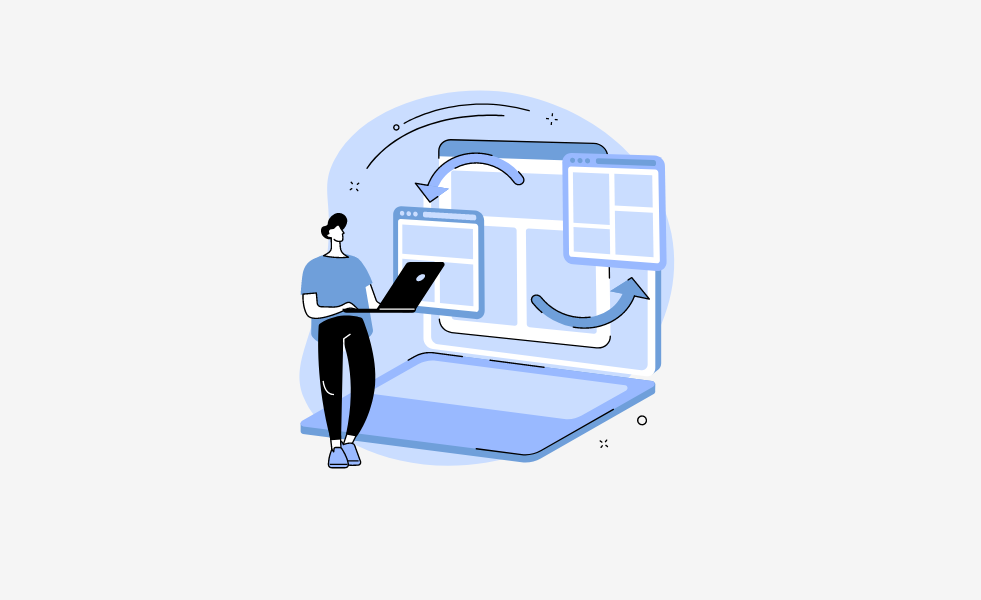
A blog and a website have different types of content as they serve various purposes. As said earlier, a blog is text-heavy, while a website is media-heavy.
Let’s take a deeper look into the structure of each of them.
Blog Content and Structure
A blog has 4 main components of its structure
- Title: This is a headline that gives a quick intro as to what this blog is about
- Introduction: This provides the reader with a synopsis of what he can expect in the blog
- Body: This elaborates on the topic and gives all the details
- Conclusion: This is a small summary of all the key points and the final word about the topic
However, there is more that you can add to make it more appealing and engaging to read, such as
- Visual content: This helps the reader stay engaged and continue reading
- Tables and charts: This helps you present the information in an easy-to-consume format
- Headings and subheadings: This helps to have a clear outline and structure of topics so the reader can understand the flow of topic sections.
Website Content and Structure
The structure of a website content consists of various components as follows.
- Header and Menu: These are like buttons that help users navigate to relevant pages of your choice. For example, home, contact me, and services options that are available at the top of the website.
- Images: A website consists of visual content like images and other multimedia representations like infographics, design, etc.
- Logo: Most websites have their logo published, be it a picture of a company or a text-based logo.
- CTA: This is the most important component of a website. This button lets the visitor take your desired action to convert.
All components must be strategically placed to appeal to the prospect and enhance user experience.
That will help the visitor or the audience to make the right move by clicking on the CTA.
Blog vs Website: Engagement

Blog Engagement
A blog and website have different content formats and structure hence the way the visitors interact with the content on each of them will also differ.
Let’s discuss how it differs between blogs and websites.
1. Comments
This is a well-known metric for engaging on blogs under each blog post.
Since the content is dynamic on blogs the visitors can comment and share their views or appreciation for a particular blog post.
Here is an example :
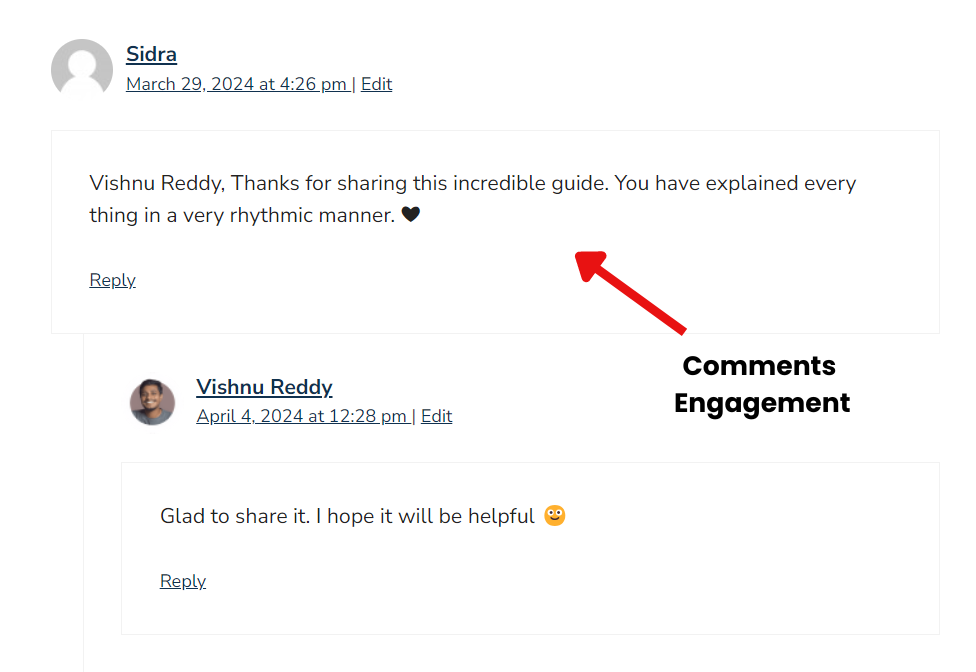
As you can see above, the visitor read one of my blog post future of blogging, and he engaged on the blog with comment in appreciation of the article.
Now, as a author or publisher, I replied to the comments of the visitor on the blog post.
So, comment section under the blog posts is the best way to interact and engage with the readers of your blog website.
2. Share with others
Blogs are informative pieces of content, so when a reader finds your content useful, they may share it with their connections.
For example :

As you can see above, whenever a visitors reads the article, if he/she likes and believe, it will helpful other in their connections, the readers shares with their community.
This is one of the most preferred types of engagement as it brings more traffic to the blog.
3. Call to actions (CTAs)
A CTA button is the preferred action that you want your visitors or readers to take a desired action.
Here is an example :

As you can see above, I have placed the above call to action button on my homepage to download the free checklist of SEO and WordPress.
So, a visitor might click on the call to action button and download the checklist by entering the email Id.
Call To Actions are the best way to engage your blog readers to take a desire action that you want from the readers.
The CTAs can be anything like downloading checklists, reading other blog posts, filling the forms etc.
Website Engagement
1. Understand your business
When the audience visits your website when they are looking for something or when they specifically search for your website, they will explore your website.
They will explore your website to understand about your business products or services and whom you want to serve from your website.
2. Clicking the CTAs
When a visitor visits your website and finds your offer relevant and attractive, they tend to buy from you. This is the ultimate engagement goal for a website.
Example: Buying an iPhone from the Apple website.
3. Contacting you
The visitors might want to contact you when they are interested in your services or offer, but they want more details before making the buying decision.
In this type of engagement, the business conversion generally happens after contacting to you.
Blog vs Website: Strategies

Just starting a blog or a website will not guarantee traffic, monetization, or achieving any of its objectives, because if that was possible everybody would have done it and reaped the benefit of it.
However, there are a few strategies That can help a blog/ website perform better and stay ahead of the competition.
Blog Strategies
1. Selecting a niche
Writing on any topic that pleases you without any particular category of topics, can be done if you own a blog just as a hobby.
But, if you are thinking of growing your blog, building a community, and eventually monetizing it, you need to have a specific niche.
By having a niche, your audience can identify you for a specific topic or area, the more specific your niche is, the better your chances of growing your blog.
For example: ‘The veg recipes of India’ is a popular blog. The niche is both topic-specific (Veg recipes) and location-specific (India)
2. Producing content regularly
It is important to have a frequency of posting blogs, like 1 blog a week or 2 blogs a week, and post quality blogs frequently.
The more you upload blogs of good quality, the more information you are providing through your blog, and many people are going to read it. That will bring more traffic to your blog.
Have a content plan, and a list of topics that your audience would be interested in, and post them regularly. It’s important to have consistent posting schedule to see growth and success with blog.
3. Get more visitors
Getting more visitors to read your blog is the most important factor in growing your blog. Though engaging content will get readers to stay on your blog, that alone will not be sufficient.
Therefore, you need to perform SEO(search engine optimization) to bring new users to your blog and keeping the existing users updated about new blogs being posted.
You can also do this by promoting your blog on other social media platforms, asking people to sign up for your email list, etc.
4. Network with fellow bloggers
This strategy of networking with other bloggers is underrated. They are other creators who engage the most on other creators’ blogs to build relationship.
Your target audience may read the blog and the creators engage by commenting on your blog or reaching out to you to collaborate with you.
Networking and building relationships with other fellow bloggers might bring you new opportunities to grow your blog as well as your brand authority.
Also read : Advantages and disadvantages of blogging
Website Strategies
1. Keep the information updated
Yes, a website is not dynamic like a blog to keep updating content on it, but there might be some information that needs to be updated now and then to provide the right information to the visitors.
For example, update your FAQs when you launch a new product or services, update your address when you move to a new office, etc, whenever it is needed.
2. Have a good website structure
Have you ever tried contacting someone through their website by filling out a ‘contact us’ form, but there is no proper response? Or have you clicked on a button expecting a particular information but you land on something irrelevant?
This happens when the website has broken links or navigation issues. So make sure your website is working well else that will lead to a bad user experience for the visitors.
3. Include the right CTA
Similar to how navigation and the right content are important, using the right call to action is equally important. A call to action (CTA) is a hint for the viewer to do what you want them to do (taking an action).
Example:
- Subscribe to the mailing list
- Fill the form
- Book now
4. Make it discoverable
To make a business visible to the audience, both online and offline methods must go hand in hand. Utilize multiple channels to drive traffic to your website.
Here are a few methods to make it discoverable
- Invest is blog and produce content as per your target audience.
- Link your website will all your other social media handles
- Add your website URL to your Google business listing if it’s local.
- Incorporate relevant keywords in your website content
- Print your URL on your business cards
Blog vs Website: Monetization
The ultimate purpose of starting a blog/website is to make money from it. A blog and website sometimes move their traffic around with one another to monetize.
Here are a few ways through which you can make money using a blog or a website
Blog Monetization
1. Displaying ads
This is the easiest way to monetize your blog. Once you have a good number of visitors, you can allow advertisers to show their ads on your blog,.
You will be paid a fee or commission based on the number of ad viewers and clicks.
2. Affiliate marketing
This is one of the common ways to monetize your blog. Here you talk about a particular topic and add affiliate links to a related product or services.
If a visitor uses that affiliate link to land on the seller’s page and buy from them, you will be given a small payout for each of the sales that happened using your link.
3. Memberships
As a blogger, you can provide exclusive content and information for your paid subscribers. Once you have a good following and established online presence in your niche, you can offer exclusive memberships
Through these paid memberships you can share more value and upsell your exclusive offers to the members.
4. Sell Digital Products
There are many popular bloggers who build a strong personal brand for themselves and sell their merchandise to their loyal followers.
Some bloggers go on to publish books, e-books, Courses, mentorship, etc., and sell them to their followers or audience on their blogs.
Also read : Future of Blogging
Monetize Website
1. Sell your own product/service
A website has more narrowed objectives, unlike a blog that could be started as a hobby, a website is created with a defined goal of growing business or increasing brand visibility.
The website has details and promotional content about its products and services for the user at the bottom of the sales funnel to consume.
A website could have a blog as a part of it as well, to generate more traffic and leads. However, the final conversion happens on the website.
E-commerce websites are the best example of this.
2. Subscription/memberships
This is similar to that of blogs, where the subscribers have exclusive access to certain products and services.
Many platforms like Spotify, Grammarly, etc provide free content during the trial period or access to certain features in the freemium and you will have to pay to access that content after the trial period or to unlock more features beyond the freemium scope.
Blog vs Website: Which is Right for You?
Choosing between a blog and a website depends on your purpose.
Most businesses have a website but not a blog. You can always start off with a blog and later add pages to make it look like a website.
Similarly, if you own a website, you can add a blog section to it to reap its benefits
So,
- If you want to share your experience just as a hobby then start a blog.
- If you want to sell your digital products like courses, or e-books, start with a blog then add a website later on
- If you have a business and trying to sell products or services then make a website about your business.
- If you want to establish yourself as a subject knowledge expert then start a website with a blog section.
Conclusion
To conclude, Blogs are regularly updated, text-heavy content. They leverage SEO for community building, and on traffic generation for monetization through affiliate links, subscriptions, and advertising.
Websites are more structured interface, multimedia content, and specific purposes like business branding, sales, and announcements.
Ultimately, whether to choose a blog or a website depends on your goals.
Starting with a blog is a viable option for personal expression, community building, and traffic generation.
While a website is essential for professional branding, direct sales, and a more formal online presence
Blogs and websites don’t always need to be seen as 2 different things, as they can be used together to tailor your online presence according to your evolving needs.
I hope this article gave clarity between blog vs website, If you have any queries, you can ask them in the comments. I like to read and reply to them.
